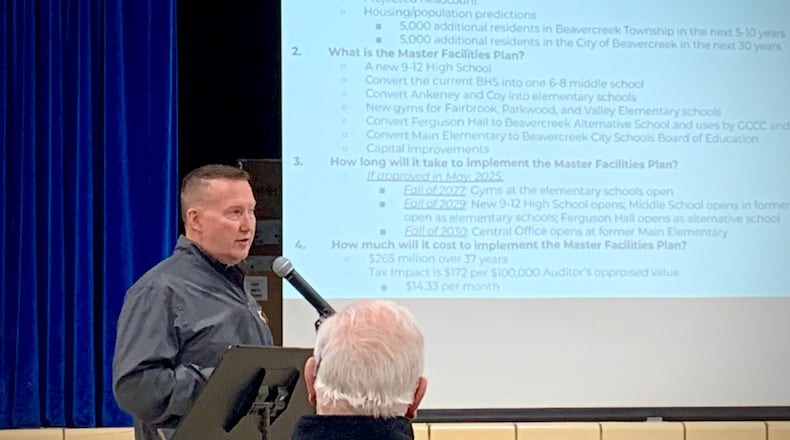“Moving forward I fully anticipate that the board will pause on our master facilities plan,” said Superintendent Paul Otten. “We need to find something our community can support.”
Otten said he does not believe a bond issue would go before voters in November, possibly not for another year as the Board of Education and stakeholders come up with a “Plan B.”
Meanwhile, Otten said the district will rely more on portable classrooms to address elementary buildings that are at full capacity.
Beavercreek’s multimillion-dollar bond issue would have funded construction of a new high school and would have created a domino effect, changing the use of several existing schools.
Sugarcreek fire levy
Sugarcreek Twp. voters approved a 1-mill property tax issue to fund fire operations and equipment by a ratio of 62% to 38%, according to unofficial, final results from the Greene County Board of Elections.
Sugarcreek Twp. officials say this is their first fire levy in a decade. Levy funds will go toward fire department payroll, plus materials including fuel and equipment.
“We are very pleased that our residents voted in the majority to approve our levy,” township Administrator Barry Tiffany said. “These are essential dollars for safety services, for fire and EMS. What this means is we will be able to continue to provide the level of service our residents have come to expect.”
The permanent levy will cost homeowners $35 for each $100,000 of appraised home value.
Franklin school levy
Voters turned down the Franklin school district’s tax levy request with 66% voting against the levy and 34% for the levy, according to unofficial, final results from the Warren County Board of Elections.
The five-year, 6.301-mill property tax levy would have raised $4.5 million annually to fund district operating costs, and would have cost homeowners $220.54 a year for each $100,000 of appraised home value.
It has been 11 years since Franklin City Schools last had a new-money levy pass for daily operating costs, Superintendent Michael Sander said.
“The levy’s outcome is definitely not what we had hoped for,” Sander said. “We are very disappointed for our students and the reduced learning opportunities that will result from the levy’s defeat.”
The district outlined $1.2 million in cuts to be implemented for the 2025-26 academic year if the levy was not approved. They include eliminating all-day kindergarten, reducing busing to state minimum levels with no high school transportation, as well as implementing higher school fees, higher pay-to-participate fees and larger class sizes.
“The Board of Education will need to consider next steps regarding future levies,” Sander said.
According to the district’s five-year budget forecast, Franklin began this school year with less than 10% of a year’s spending in the bank, which is the lowest in the region.
Franklin fire levy
Franklin voters rejected a fire department levy by a 54% to 46% ratio, according to unofficial, final returns from the Warren County Board of Elections.
“The voters have spoken and let us know that they currently don’t have the palate for a 4.9-mill levy,” Mayor Brent Centers said.
Centers said there is a strong need in the fire and EMS division to update equipment, staffing levels and apparatus and that while unfortunate, it also is understandable with many people facing a difficult time amid current economic conditions.
“We always respect the outcome of the voters and will be discussing next steps at our Franklin City Council meeting,” he said.
About the Author


